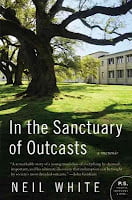 Are you sensing a theme? I love non-fiction. So, up today is another memoir that I recently stumbled upon when browsing a bookstore: Neil White's tale of his prison experience alongside a leper colony in Carville, Louisiana. I've always been fascinated memoirs, letters or other writings made by folks in prison as it usually describes a time in people's lives when they get to the heart of what it means to live, breathe and be a human being. It's cut to the chase kind of literature.
Are you sensing a theme? I love non-fiction. So, up today is another memoir that I recently stumbled upon when browsing a bookstore: Neil White's tale of his prison experience alongside a leper colony in Carville, Louisiana. I've always been fascinated memoirs, letters or other writings made by folks in prison as it usually describes a time in people's lives when they get to the heart of what it means to live, breathe and be a human being. It's cut to the chase kind of literature.
And in this case, Neil White was sentenced to 18 months for bank fraud. White lived for many years pretending if the rules of finance didn't apply to him all in hopes of making it to the top of his field. White craved praise, attention and success.
When I first began reading In the Sanctuary of Outcasts , I thought I might be soon disappointed in my book purchase. In nearly the entire first section of the book, White writes with an arrogant, self-obsessed, "I'm really not a criminal like the rest of them" attitude. He even tells his two small children as he was dropped off at the prison, "Daddy is going to camp" instead of the truth.
I was temped on several occasions to simply stop reading because the main character put such a distaste in my mouth. Who cared that the writing was so good? (It was!). I really didn't want to spend my free time learning more about him.
But all of this began to change as White got to know some of the persons struggling with Hansen's disease (or known as leprosy) who lived in this same compound of this low security prison, in particular Ella. Ella, a patient not a prisoner, spent her whole life at Carville, even after the federal mandate no longer required her to stay in isolation. And from Ella and other patients and inmates, White learns to tell the truth. White learns what community is like. He learns to say: "I did some not so very good things. I hurt myself. I hurt my family." And to his surprise, he finds acceptance. It's quite the journey! Consider this quotation:
“As I walked –“meddling’, as Ella would say- I found no simple answers. But I did find something else. The very act of being honest with myself, taking an object look at my life, was freeing….I still did not know exactly how to change, but I had discovered some simple truths: A good life with my children did not require wealth. It was vital to be honest, without worrying about my own image. And helping others was more noble than winning awards.” (212-213)
I would recommend this pick for anyone interested in a transformation story, any preacher or teacher of the Bible-- as it is a great tool to understand the modern connection of leprosy, or anyone wanting to explore the justice (or injustice of) the prison system. I'm sure the next time I preach on a text with leprosy mentioned within, I'll pick up In the Sanctuary of Outcasts and find a great illustration.
Up tomorrow: Unorthodox: the Scandous Rejection of My Hasdic Roots by Debroah Fieldman